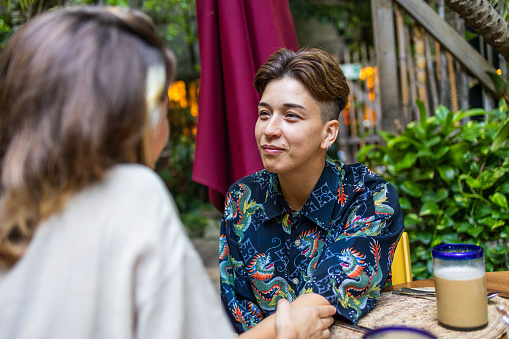
When fostering love in your twenties, it can feel like unknown territory. For some, you may have entered your twenties with your high school sweethearts and are trying to grow your relationship as you grow as an individual. For others, you may have ended an important relationship and find yourself in your mid-twenties figuring out what love and romance need to look like for you. This time of your life is often when you are still determining your self-identity. Your brain is still developing; your life experience has just begun, and you are transitioning to more independence and responsibility than ever before.
Romantic love is not the be-all-end-all of a satisfying life. However, it can be the catalyst for a lot of our development and growth; it can inspire us to make bold choices and completely change how we see the world and our place in it. With everything else going on in this decade, you may feel like a serious adult relationship is yet another minefield; it can be all-consuming, make us feel more vulnerable than we’ve ever felt, and frustrate us. Love isn’t like the movies, for one simple fact: we’re not watching from the outside. Once you are in a relationship, with only your point of view to go on, you may find that you have no idea how to navigate your relationship. That doesn’t mean that love in your 20s is to be avoided. Not in the least!
Why is it important to foster love in your 20s?
- You can experience a love that aligns with your values. In our twenties, as we are finding a foundation for our self-identity, romantic relationships play a big role. We learn and test what we like and don’t like, how we want and expect to be treated, and what our priorities are. We are able to pursue bonds with people who appreciate the same things we do. Further, we are able to pursue bonds with people who appreciate the things about us we value most highly about ourselves. This creates a strong sense of self-confidence and self-love.
2 You get to practice healthy boundaries and communication when you have authentic romantic relationships. Somehow, it can be more difficult to exert independence and boundaries and

communicate our real feelings outside of our platonic relationships. When a romantic relationship is healthy and built on trust and mutual respect, however, you develop skills that will support your relationship and transfer to all other interpersonal relationships in your life.
- Getting an early start can help you navigate dating and help you figure out what you want out of life and a relationship. Your twenties are not a time to arrive at your final destination; rather, they are the beginning of your adult life. In your twenties, you are still growing and exploring. Learning from the relationships you experience during this time is invaluable, whether you end up with someone you’ve met or not.
5 Ways To Foster Love In Your 20s
1) Practice open and compassionate communication:

We can all agree that communication is one of the most important things in a relationship! It is important to share with your partner how you feel and what you want to see from them. By doing so, you can set boundaries and figure out what your next step is together.
Your twenties are a time for finding your voice and exploring who you really are. Part of the process of this evolution is being willing and able to advocate for yourself. This doesn’t mean that you do all the talking in your relationship. This means you do yourself and your partner the favor of being straightforward, of trying to navigate the situation with openness. You cannot learn how to work together in your relationship without being vulnerable enough to share. You cannot learn how to work together in your relationship without being an active listener.
This might be the first time in your life that you are trying to communicate in a more adult manner. Make sure that whoever you invest in is willing to elevate their communication style. If you’re unsure how to approach and facilitate these kinds of conversations, you may want to invite a counselor to give you some tools, whether you see that person on your own or go together as a couple. There can be a stigma around going to couples’ therapy, but there is absolutely nothing wrong with visiting a neutral third party who can help you to voice your thoughts and to absorb what the other person says.
A healthy relationship requires work and maintenance, the same way all other aspects of health do. You wouldn’t go to the gym and lift weights for a few months, then expect that work to last for the rest of your life. Why would you expect that of a relationship?
2) Understand each other’s love language:
Everyone has a different love language, and it is important to learn what your partner’s is in order to communicate better and better serve one another in your relationship. Taking

the time to cater to your partner’s love language (and vice versa) will only strengthen your bond and enhance your relationship.
Knowing your partner’s love language doesn’t mean you’ll automatically show them love perfectly. First of all, there is no such thing as executing a relationship flawlessly. Secondly, actions take practice to become habits. If your partner’s love language is quality time, and you are busy, you may have to look at your current patterns to find more space for your partner one on one or create a rule for yourself that you tuck your phone away when you’re together so that you’re not interrupted. You may want to schedule a regular date night.
The other thing you need to know is your love language. The nice thing about your twenties is that you are learning about yourself as an independent human – this may be the time when you move out of your parents’ home for the first time, or you relocate to a new city and feel like you have a brand fresh start. As you explore yourself, you may learn that you value different things that you thought you did. You may even learn this from a partner; maybe you build a relationship with someone whose preferred love language is physical touch and realize how much you enjoy it as well! The point is to be open-minded and honest with yourself. There are no wrong answers. However, you most feel loved, seen, and appreciated is right for you.
3) Have a life outside of each other:

Even though you have found your other half, you both should have your own separate lives that do not revolve around each other. You need to be your own person to avoid being dependent on one another; after all, you and your partner can’t be attached at the hip 24/7. If you spend enough time with someone, you will also find that you run out of things to talk about if neither of you are going out and living a life outside the two of you.
Your relationship is not a distraction from your duties but an extension of your life. Invest in the life you already have and the life you want to experience. What brings you joy? What helps you focus? What helps you unwind? Where do you see non-negotiables, such as earning a living, self-care, family, and friends? When we fall in love, we are so overcome with the rush of emotions that we can neglect the people we have loved all our lives. Because these are the people who often love us unconditionally, we are tempted to rely on their understanding. However, because these people have loved us loyally and unconditionally for years, they deserve a place of respect and appreciation in our hearts. Don’t leave them behind, don’t leave yourself behind.
4) Do what works best for you and your partner:
In the era of social media, it is easy to constantly compare your relationship to those you see online. You see what someone else is posting, and it looks great – it looks like the key to happiness. However, if you really stop and think about it, you might realize that there is nothing about what you’re seeing that would work for you. Not the aesthetic, not the way they travel, not their weekly routine, none of it. You and your partner should do things that work best for you without basing your relationship on what others are doing. What you see on social media might look appealing because that couple has found what works for them and gives them a sense of fulfillment. (You may also need to remind yourself that social media isn’t real life, and people are curating their feeds more than ever before to create an image instead of really sharing what is going on.)
It’s not just social media that can impact us and pressure us. The people around us can also weigh in on our relationship and make us question or doubt what’s going on. (If your trusted loved one

is voicing concern for your health or safety, that is something entirely different.) But insisting that weekly hikes together are the key to a successful union is not at all helpful if neither you nor your partner enjoys hiking. While these people may be well-meaning, they are not the authority on healthy relationships. It can be tricky to navigate the “advice” of others; remember to take their words with a grain of salt and assert your boundaries when needed. Another perspective can be helpful: it can make you see something you didn’t see or make you see something in a different way. It can make you realize what you don’t want. But your routines, habits, and inside jokes are not for anyone else to determine or validate.
Be present in your relationship. Although it cannot be 50/50 all the time, always put your best foot forward and show up for your partner. Aim to have balance in what you are doing for each other, what you are doing with each other, and when and where you are compromising. Yes, it’s great if you participate in things you both enjoy, but it is also nice to take an interest in the other person’s passions when you can. And yes, a world without housework would be great, but chores and errands will always exist and shouldn’t fall to one person only.
5) Work on yourself first:

While this blog is about how to foster love between you and another person, it is also necessary to mention that you cannot foster love with someone else if you don’t love yourself first. Sometimes, we hear the saying, “Nobody will love you if you don’t love yourself,” but that is not true. What will happen is that you won’t be able to receive and engage in healthy love if you can’t love yourself. Someone who loves you more than you could ever imagine might come along, but you won’t be able to accept that love fully. You won’t be able to build on that love and invest in it because you don’t have your natural sense of self-love, self-care, and self-confidence to feel worthy of that love.
You may worry about your ability to work on yourself. Self-love is a process that goes on throughout your entire life. It changes and grows as you do; sometimes, it feels easy to do, and other times, it is more of a challenge. How do you continue to keep perspective on your life events? To what do you turn when things are hard or when you feel like you’re too immersed in a situation to consider all angles? You may find that you benefit from attending therapy. Therapy is not only a great way to check in with yourself through tough times but a solid ongoing practice for working on yourself. This is because the act of committing to therapy sends a message that we are committed to feeling our best, knowing ourselves, and exploring and learning more.
If you recognize the value of fostering love but aren’t sure how to go about it, you may feel overwhelmed about where to start. Whether you are journaling, talking to your loved ones, attending therapy for young adults such as our practice here in Woodland Hills, or were considering this topic for the first time as you read this blog, know that there are ways to approach this goal of forming a healthy romantic relationship in your twenties. If you are willing to do the work, you are able to reap the reward. Remember that you are not the only person in a relationship; you cannot make a healthy relationship happen by doing all the work yourself. Find someone who wants to invest in you, and invest in them. And never forget to invest in yourself first.
Adulting is Hard! Embracing You Therapy Can Help
Here at Embracing You Therapy Group, we understand that adulting can be hard! Being a young adult in our current climate, it is normal to feel overwhelmed or pressured to figure it all out! Therapy is a safe place to explore your identity, identify your boundaries, and learn life skills to communicate them effectively.
Our Therapy for Young Adults is tailored to late teens (15 and up) and people in their 20s to create a solid foundation for your life. We’ll work together to find tools that help you respond to life in a healthy, confident, and loving way. Contact us today for your complimentary 20-minute phone consultation with our Client Care Coordinator.



